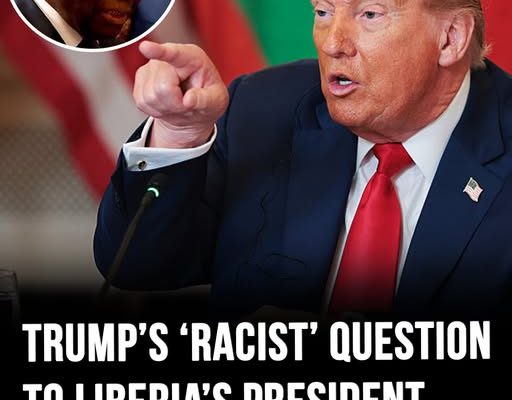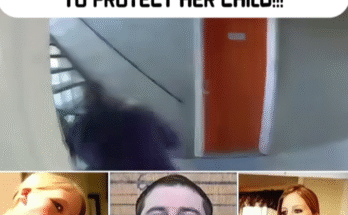During his first term, Donald Trump sparked outrage across Africa and the Caribbean when he allegedly referred to Haiti and African nations as “sh-thole countries.”
But on Wednesday, the U.S. president struck a noticeably different tone — although one comment still left critics fuming.
While meeting with Liberian President Joseph Boakai, Trump praised him for his “excellent English.”
What he seemed unaware of, however, is that English is Liberia’s official language — and Boakai was educated in his home country.
One offhand comment
Donald Trump’s foreign policy toward Africa has been marked by controversy. He cut millions in humanitarian aid and granted refugee status to white South African farmers while restricting travel from several majority-Black nations.
In a bid to push back against China’s rising influence in Africa and strengthen ties with the continent, Trump welcomed the leaders of Gabon, Guinea-Bissau, Liberia, Mauritania, and Senegal to the White House on Wednesday. The meeting, focused on boosting business relations, marked what Trump called a shift in strategy, moving “from aid to trade.
“We treat Africa far better than China or anybody else,” Trump declared.
He praised the visiting nations as “vibrant places with very valuable land, great minerals, great oil deposits, and wonderful people.”
But one offhand comment to Liberia’s President Joseph Boakai is drawing fire online and reigniting criticism over Trump’s past remarks about Africa.

During the meeting, Boakai thanked Trump for the opportunity to collaborate on peace and security. That’s when Trump cut in.
“Thank you. And such good English. Such beautiful. Where did you learn to speak so beautifully? Where were you educated? Where?”
Boakai calmly replied that he was educated in Liberia — where English is the official language. Trump’s reaction?
“That’s very interesting. Beautiful English! I have people at this table who can’t speak nearly as well.”
”Peak ignorance”
The comment, intended as a compliment, immediately lit up social media and diplomatic circles.
“I felt insulted because our country is an English-speaking country,” said Archie Tamel Harris, a Liberian youth advocate, in an interview with CNN.
“For him to ask that question, I don’t see it as a compliment. I feel that the U.S. president and people in the West still see Africans as people in villages who are not educated.
Liberia is a country on the west coast of Africa with about 5 million people. English is its official language.
It was founded in 1822 by the American Colonization Society, a group that wanted to resettle freed slaves from the U.S. Liberia became an independent nation in 1847.
A Liberian diplomat, speaking anonymously, called Trump’s words “a bit condescending.” And Rep. Jasmine Crockett (D-TX) didn’t hold back on X:
”Trump never misses an opportunity to be racist and wrong, and every day he finds a new way to be embarrassing. Asking the President of Liberia where he learned English when it’s literally the official language is peak ignorance.”
Even South African politician Veronica Mente chimed in online, questioning why Boakai didn’t just walk out.
Not the first time
This isn’t Trump’s first time under fire for how he addresses non-Western leaders. As mentioned, he infamously referred to Haiti and several African countries as “shithole nations” in 2018.
Though he denied the term, Senator Dick Durbin, who was in the meeting, said Trump made “hate-filled, vile and racist” comments, and repeated them.
In the years since, Trump has doubled down on English-first rhetoric. In March, he signed an executive order declaring English the official language of the U.S. And in past meetings, he’s openly judged foreign leaders by how “nicely” they speak.
During a meeting with Germany’s Chancellor Friedrich Merz, Trump asked,
“Is your English as good as your German?”
Merz replied with a laugh, “I try to speak as good as I can.”
He’s also sidestepped reporters based on how they speak.
“I can’t understand a word he’s saying. It’s the accent,” Trump said of an Indian journalist in February.
Speaking to an Afghan reporter, he offered: “Beautiful accent… only problem is I can’t understand a word.”
White House: “It was a compliment”
Despite the uproar, the Trump administration insists the Liberia remark was meant kindly.
“The continent of Africa has never had such a friend in the White House as they do in President Trump,” said Massad Boulos, senior advisor for Africa.
White House deputy press secretary Anna Kelly echoed the sentiment, calling it a “heartfelt compliment.”
Even Liberia’s Foreign Minister Sara Beysolow Nyanti defended the moment:
“There was no offense… What President Trump heard distinctly was the American influence on our English in Liberia, and the Liberian president is not offended by that.”
The African leaders also expressed appreciation — and even admiration — for Trump. Boakai said Liberia supports Trump’s global vision, adding: “We believe in the policy of making America great again.”
But some critics argue that Trump’s “business-first” approach still lacks substance.
“Chinese success in Africa is perhaps partly due to the failure of U.S. foreign policy,” wrote Chinese political scientist Wenfang Tang last year, noting that while the U.S. often takes a “moralistic” tone, China treats Africans as “comrades and business partners.”
Was Trump’s comment a genuine compliment — or just another tone-deaf remark rooted in outdated views about Africa?
Some say it was a friendly nod to Liberia’s American ties. Others see it as another example of condescension toward a continent he’s repeatedly offended. What do you think — harmless praise, or a diplomatic blunder?



